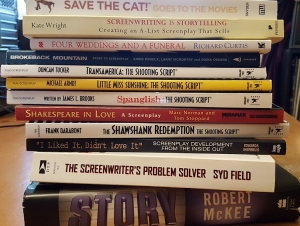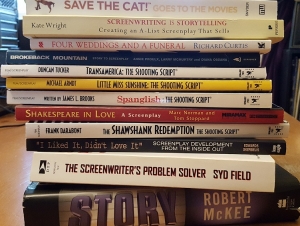by Renée J. Lukas
 There seems to be no shortage of advice for writers these days. And isn’t that funny? It seems no other profession prompts such a deluge of advice. Can you imagine similar articles for cardiologists? “How You’re Operating on the Aorta All Wrong!”
There seems to be no shortage of advice for writers these days. And isn’t that funny? It seems no other profession prompts such a deluge of advice. Can you imagine similar articles for cardiologists? “How You’re Operating on the Aorta All Wrong!”
Everyone claims to be a guru who can help you jumpstart your writing career. It’s only after you’ve poured your blood and sweat (sorry for the gross visual) into your work for a while that you realize what really works and what doesn’t.
That’s what I’m doing here. I don’t claim to be a guru, but a writer who is sharing some things I learned along the way. Nothing on this blog should be considered a hard and fast rule.
So, before you pour your blood and sweat into this crazy career called writing, here are a few tips I would have ignored if I could go back in time.
Tip #1 – Keep your REAL job, and just write on the side.
Yes, we all need jobs that pay the bills. If you’re starving, you can’t think, let alone write. Having said that, I take issue with the phrase “on the side.” In truth, writing is a craft that takes time, thought and plenty of rewrites. The truth is, too many people, including writers themselves, treat writing as a frivolous hobby instead of the demanding career it really is. When you do that, you not only sell yourself short in terms of pay, but also in your mindset as an actual writer. When I had a separate full-time job, I wrote on lunch hours and weekends. It took me well over a year to get a respectable draft of a screenplay completed. I knew I was going to have to put in more time if I was going to launch a writing career. “On the side” implies a side dish, like a salad, with the entrée being your real job, or a steak. And for you vegetarians, the entrée could be a vegetable lasagna. But I digress. I happen to know that writing is no side dish, but a very real job in itself. So if you can’t quit your full-time job right now, but you know you want to be a writer—and not one of those people who just talks about writing—change your mindset. Start thinking of the full-time job as the side dish and put more of your time and energy into a writing project. A change in your thinking will often lead to changes in results.
Tip #2 – Work on one project at a time.
This doesn’t work for me. If it works for you, that’s great. But the real truth is that not everyone’s writing process is the same. This ties in to another tip, “you can’t only write when you’re inspired.” I agree that you must continue to write, whether or not the muse arrives. But if you juggle three projects, work on the one you’re excited about each day. If you’ve reached a stopping point on one project because it seems to have run out of gas, the next time you approach it, you’ll have some fresh ideas about it. This keeps stories from becoming boring, and before you know it, you’ll have three finished books instead of one! This tip is best ignored by those of us who have ADD.
Tip #3 – You must read a lot to be a good writer.
Now before you send me hate mail, I do agree that it is good to read as much as you can. Absolutely. After all, would you expect a good screenwriter to have never seen a movie? However, it’s also important to know that writing uses a different side of the brain than reading. When I was younger, I had trouble focusing long enough to finish reading a book. My mother told me I had to read Harriet the Spy before the summer was over. It was a nightmare. I would sit on the floor, kicking my legs, feeling restless, unable to discern what Harriet was doing and why. I’m sure it was a great book, though I never did finish it. It sat on the bookshelf, taunting me all summer long. So I assumed that this meant I could never be a writer. Not true! Luckily, as I got older, I was able to focus and read more. I even worked as an editor! But I almost let this often-heard “rule” about reading discourage me from doing the thing I love most. Don’t let that happen to you!
Tip #4 – Query letters are the best way to reach agents.
I spent half my life querying agents. I even got many responses. Now don’t get me wrong. Query letters or emails are a good way to reach people in the business, but not necessarily the decision makers. And if you don’t know who’s who at the agency, your query could go unanswered simply because you directed it to the wrong person. Other potential reasons you don’t get a response: they’ve changed the creative direction they’re going in, the agent you queried has left to go to another agency (this happens a lot), they suddenly have too many sci-fi projects and yours is sci-fi, or with email queries, it may have gone into the spam folder. The best way to find an agent is to meet someone who can tell you what’s what, someone with a real track record, someone you can trust. Screenwriting for film and TV can seem like a secret society. As long as you don’t know the password, you may feel like an outsider. That’s precisely why there are so many books about breaking in! If you can find someone who knows someone, your chances of success are doubled. In this day and age, with social media, email and Skype, it’s a little easier than it used to be to find that someone who can help your career, especially if you don’t live in New York or L.A.
Which brings me to the last one. . .
Tip #5 – Living in L.A. is the only way to sell a script. Or the modified, “You don’t have to live in L.A., but it helps.”
The reality for many of us who aren’t in our 20’s is that we can’t simply pack up and move to L.A. As I said in Tip #4, today’s technology brings everyone closer, no matter where you are. I’m currently working with a producer in Vienna, actors in New York and Florida, and will most definitely spend a few weeks each month in either L.A. or New York, after which I can return home to think up more brilliant stuff. So, as much as I complain about technology—the way my family stares at their phones instead of talking to each other at home—the really good thing about technology is our ability to communicate with people who can be on another coast and in another time zone, and it feels like they’re right in the same room! So before you pack your bags, make sure that a move to L.A. is really right for you. If it fits with your goals and you’re able to do it, go for it. If not, don’t sweat it.
Keep checking my blog for more tips and ideas to help you become a more successful writer!




